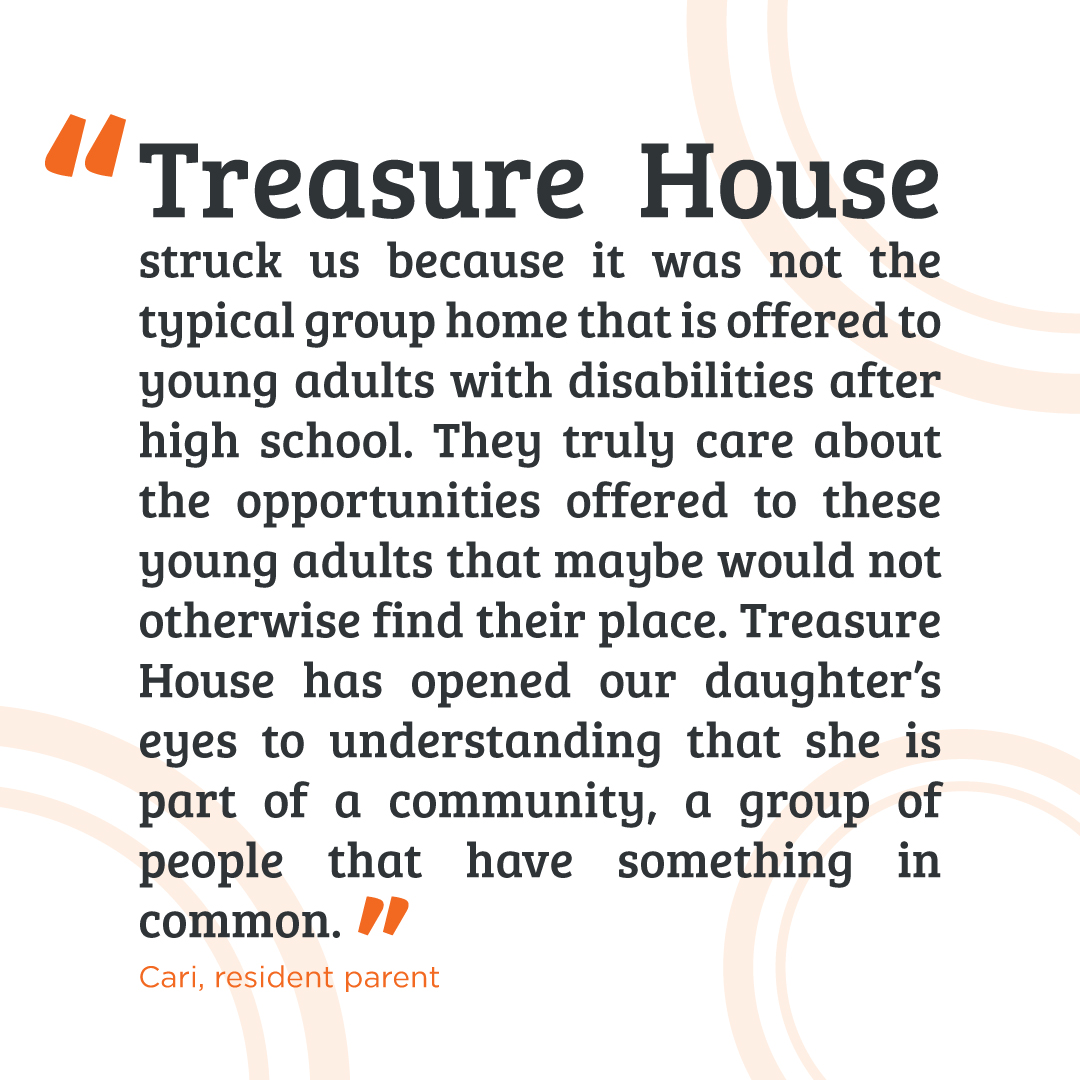
Explore a new era in housing for individuals with intellectual and developmental disabilities (IDDs) at Treasure House Phoenix. As demand grows for safe and integrated living, this Supported Living Residence offers a unique model fostering independence, purpose, and belonging. In this blog, discover how Treasure House differs from traditional group homes, providing a transformative solution that champions individuality and community integration.
Group homes can be an excellent option for people with IDDs if their goal is to feel more confident about moving to a supported living residence, but they are not yet ready for greater independence. Group homes are typically owned or leased by provider agencies, and often follow a structured program or routine that is tailored to the collective needs of the residents. Residents in these settings may have little control over where and with whom they live, the services they receive, or the routines of daily life. Activities and schedules may be more standardized, decisions may be made collectively or by staff members, and engaging, inclusive and life-changing options may be limited.
Treasure House residents have flexibility and a variety of options in determining their daily routines, activities, and personal goals. We place emphasis on empowering individuals to make choices that are right for them, and to lead fulfilling lives according to their personal preferences. Residents choose where they work, how they integrate into the community, who they spend time with, and more. While our Life Coaches and Community Assistants help residents take the necessary steps to achieve their dreams, the daily journey and the destination are uniquely crafted by the dreamers. Each resident leads a personalized life, like the rest of us!

A group home might be an ideal housing option for people with IDD who cannot manage their health or emotional needs with or without intensive support. This type of environment tends to provide a higher level of behavioral and medical support, and supervision for residents. People living in group homes may have significant difficulties performing activities of daily living, and may require staff assistance with personal care, housekeeping, transportation, and medication management. Some group homes also offer rehabilitative services and employ specialists, including speech therapists, physical therapists, and counselors.
While Treasure House residents receive various levels of support, the focus is on enabling them to live as independently as possible. Support staff are available on-site 24/7, but the level of assistance is often less intensive compared to a group home. Life Coaches direct their attention to activities that might enhance each resident’s life, such as setting reminders to execute tasks on their own, budget management, health and fitness planning and execution, and developing meaningful relationships. Life coaches work with residents to find jobs and volunteer opportunities by preparing them with interview skills, job coaching, and organizational training. Residents also work with a certified nutritionist to optimize overall health and enjoy two family meals per day, prepared by our executive chef.
Treasure House is not appropriate for individuals who have a psychiatric or serious emotional disturbance that impacts behavior, have serious medical conditions that require daily or weekly monitoring or intervention, and/or require 24-hour supervision.

A group home typically refers to a residential facility where four to 15 individuals with IDD live safely together under the supervision of staff members. While group sizes vary, they generally tend to be smaller than most long-term care facilities, and sometimes segregate by gender. Group homes may offer shared spaces for residents, and private or shared bedrooms.
Treasure House is home to 29 residents, and offers a more independent living arrangement. It provides individual living spaces and community settings where residents have greater autonomy and control over their daily lives. While providing supported living to a large group or residents, Treasure House is not considered a facility, either.
“The group size has been essential, affording us the ability to not operate as an institution, and providing a plethora of interesting, new activities every day,” said Lauri Tanner, Treasure House CEO. “The amount of love and care for one another here is magical, and is something that might not be achieved quite as well if Treasure House were to exclude diagnoses or increase or decrease group size.”
Each Treasure House Life Coach manages no more than seven residents at once and serves as a constant liaison to parents and guardians. By developing dynamic, trusting, and comfortable relationships with residents, Life Coaches and Community Assistants are better able to help residents achieve their goals and set others.

When considering a group home or supported living residence for a young adult with IDD, it’s important to consider the level of independence that the individual is prepared for, and the level of support that they will require on their journey. The size of the community, as well as the inclusion of genders and diagnoses, might also be important factors. Here are some additional items that you might think about when searching for IDD housing:
Treasure House is different from a group home in many ways, and may not be suitable for all individuals. If Treasure House sounds like an ideal potential housing opportunity for you or a loved one, please inquire about admissions.
Specific characteristics and services offered can vary among different IDD group homes and supported living residences. The terms used may also differ depending on regional or local regulations and practices.
ADA Complaint Forms Instructions | ADA Complaint Procedure (Spanish) | English Form | Spanish Form ADA Public Notices English | Spanish | Title VI Notices & Forms